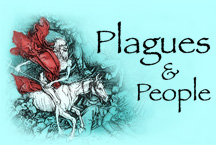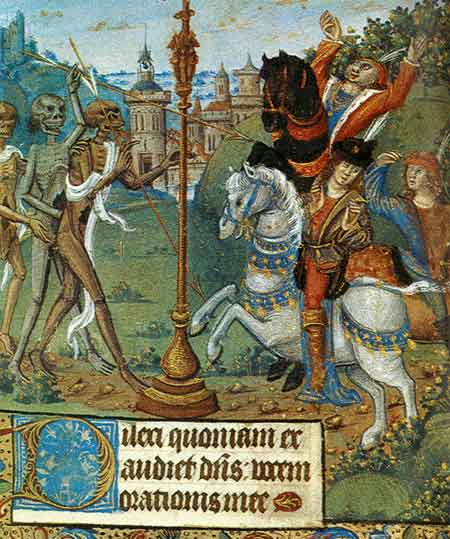|
Old English
|
Modern English
|
Thise riotoures thre of whiche I telle,
Longe erst er prime rong of any belle,
Were set hem in a taverne to drynke,
And as they sat, they herde a belle clynke
Biforn a cors, was caried to his grave.
That oon of hem gan callen to his knave:
"Go bet," quod he, "and axe redily
What cors is this that passeth heer forby;
And looke that thou reporte his name weel."
"Sire," quod this boy, "it nedeth never-a-deel;
It was me toold er ye cam heer two houres.
He was, pardee, an old felawe of youres;
And sodeynly he was yslayn to-nyght,
Fordronke, as he sat on his bench upright. |
Now these three roisterers, whereof I tell,
Long before prime was rung by any bell,
Were sitting in a tavern for to drink;
And as they sat they heard a small bell clink
Before a corpse being carried to his grave;
Whereat one of them called unto his knave:
"Go run," said he, "and ask them civilly
What corpse it is that's just now passing by,
And see that you report the man's name well."
"Sir," said the boy, "it needs not that they tell.
I learned it, ere you came here, full two hours;
He was, by gad, an old comrade of yours;
And he was slain, all suddenly, last night,
When drunk, as he sat on his bench upright; |
Ther cam a privee theef, men clepeth Deeth,
That in this countree al the peple sleeth,
And with his spere he smoot his herte atwo,
And wente his wey withouten wordes mo.
He hath a thousand slayn this pestilence.
And, maister, er ye come in his presence,
Me thynketh that it were necessarie
For to be war fo swich an adversarie.
Beth redy for to meete hym everemoore;
Thus taughte me my dame; I sey namoore." |
An unseen thief, called Death, came stalking by,
Who hereabouts makes all the people die,
And with his spear he clove his heart in two
And went his way and made no more ado.
He's slain a thousand with this pestilence;
And, master, ere you come in his presence,
It seems to me to be right necessary
To be forewarned of such an adversary:
Be ready to meet him for evermore.
My mother taught me this, I say no more." |
"By seinte Marie!" seyde this taverner
"The child seith sooth, for he hath slayn this yeer,
Henne over a mile, withinne a greet village,
Bothe man and womman, child, and hyne, and page;
I trowe his habitacioun be there.
To been avysed greet wysdom it were,
Er that he dide a man a dishonour." |
"By holy Mary," said the innkeeper,
"The boy speaks truth, for Death has slain, this year,
A mile or more hence, in a large village,
Both man and woman, child and hind and page.
I think his habitation must be there;
To be advised of him great wisdom 'twere,
Before he did a man some dishonour." |
|
|
"Ye, Goddes armes!" quod this riotour,
"Is it swich peril with hym for to meete?
I shal hym seke by wey and eek by strete,
I make avow to Goddes digne bones!
Herkneth, felawes, we thre been al ones;
Lat ech of us holde up his hand til oother,
And ech of us bicomen otheres brother,
And we wol sleen this false traytour Deeth.
He shal be slayn, he that so manye sleeth,
By Goddes dignitee, er it be nyght!" |
"Yea, by God's arms!" exclaimed this roisterer,
"Is it such peril, then, this Death to meet?
I'll seek him in the road and in the street,
As I now vow to God's own noble bones!
Hear, comrades, we're of one mind, as each owns;
Let each of us hold up his hand to other
And each of us become the other's brother,
And we three will go slay this traitor Death;
He shall be slain who's stopped so many a breath,
By God's great dignity, ere it be night." |
Togidres han thise thre hir trouthes plight
To lyve and dyen ech of hem for oother,
As though he were his owene ybore brother.
And up they stirte, al dronken in this rage,
And forth they goon towardes that village
Of which the taverner hadde spoken biforn.
And many a grisly ooth thanne han they sworn,
And Cristes blessed body they torente--
Deeth shal be deed, if that they may hym hente! |
Together did these three their pledges plight
To live and die, each of them for the other,
As if he were his very own blood brother.
And up they started, drunken, in this rage,
And forth they went, and towards that village
Whereof the innkeeper had told before.
And so, with many a grisly oath, they swore
And Jesus' blessed body once more rent--
"Death shall be dead if we find where he went." |
|


